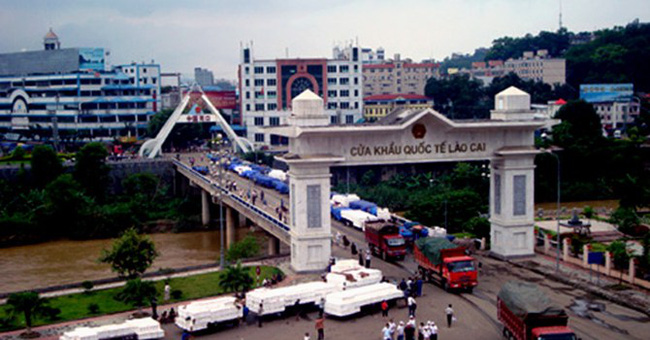
The Lao Cai border economic zone will be developed into an industrial, urban, trade and service hub, serving as a driving force for the growth of the northern mountainous province of Lao Cai, according to the zone’s master plan.
Illustrative photo (Source:
cafef.vn)
The development master plan for the zone
to 2040 with a vision to 2050 has just received approval from the Prime
Minister in Decision 1627/QD-TTg.
Under the plan, the Lao Cai border economic zone will have a total area of
15,929.8 hectares. It is projected to have a population of 90,000 by 2040.
The zone will have a core area and two
wings, which are the western and eastern economic corridors. The service area
at the border gate covers more than 356 hectares of land, slated to house areas
for fairs and exhibitions, representative offices of enterprises and
organisations, a trading centre and bonded warehouse, among other facilities.
The area designated for industrial
activities inside the zone comprises operational industrial parks (the 100-ha
Dong Pho Moi and the 85-ha Bac Duyen Hai), a 228-ha processing and packaging
zone for import-export in Bat Xat district, and an area reserved for services,
logistics, warehouse and packaging.
The plan also envisions a complex for
tourism, entertainment and sports covering more than 344 ha in Ban Qua commune,
Bat Xat district. Local cultural and spiritual sites such as Thuong and Mau
Temples will be upgraded and turned into tourist attractions, while a new
tourism route will be built connecting the border economic zone and Sa Pa,
which is a widely-known tourism site in the province.-
Source: VNA
According to data from the Hoa Binh Provincial Party Committee, the industrial production index for the first six months of 2025 is estimated to have increased by 20% compared to the same period last year. This marks the highest year-on-year growth rate for this period since 2020.
In the first six months of 2025, Hoa Binh province’s export turnover was estimated at 1.145 billion USD, marking an 18.11% increase compared to the same period in 2024. Import turnover was estimated at $ 804 million, a 17.15% increase, which helped the province maintain a positive trade balance.
The lives of the ethnic minority farmers in Tan Lac district have gradually improved thanks to the new directions in agricultural production. This is a testament to the collective strength fostered through the professional associations and groups implemented by various levels of the district’s Farmers’ Union.
With the motto the "product quality comes first,” after nearly one year of establishment and operation, Muong village’s Clean Food Agricultural and Commercial Cooperative, located in Cau Hamlet, Hung Son Commune (Kim Boi district), has launched reputable, high-quality agricultural products to the market that are well-received by consumers. The products such as Muong village’s pork sausage, salt-cured chicken, and salt-cured pork hocks have gradually carved out a place in the market and they are on the path to obtaining the OCOP certification.
In the past, the phrase "bumper harvest, rock-bottom prices" was a familiar refrain for Vietnamese farmers engaged in fragmented, small-scale agriculture. But today, a new spirit is emerging across rural areas of Hoa Binh province - one of collaboration, organisation, and collective economic models that provide a stable foundation for production.
Maintaining growing area codes and packing facility codes in accordance with regulations is a mandatory requirement for agricultural products to be eligible for export. Recently, the Department of Agriculture and Environment of Hoa Binh province has intensified technical supervision of designated farming areas and packing facilities to safeguard the "green passport" that enables its products to access international markets.



